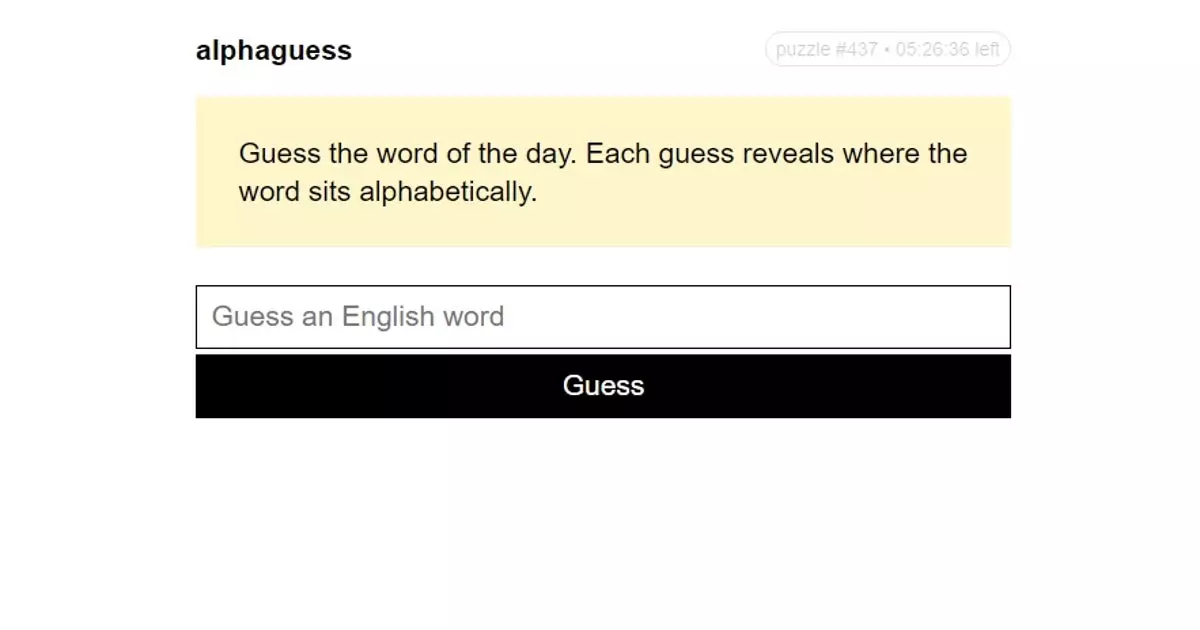In our increasingly fast-paced lives, distractions can sometimes feel like enemies of productivity. Yet, surprisingly, these diversions aren’t all bad; some are deceptively delightful. Take Scrambled Maps, for instance—a curious little game that can provide fleeting moments away from the grind. Today, I’m introducing another gem: Alphaguess, a daily browser puzzle that has achieved cult status among enthusiasts of simple pastimes. Here, players engage in a word-guessing quest, attempting to unveil a hidden term by leveraging alphabetical clues.
At its core, Alphaguess operates on a straightforward premise. Players make a series of guesses, each time receiving guidance about the target word’s position in the alphabet relative to their guess. This mechanic makes the game accessible: it requires no advanced strategy or lateral thinking, just a willingness to play along. Unlike more complex games that may require deep thought or intricate rules, Alphaguess offers a refreshing sense of simplicity.
Each day, the challenge resets, inviting users to return and test their skills anew. My efforts in this endeavor have seen me spending an embarrassing eight minutes and making 26 attempts to decipher today’s word. There’s an irony in taking so long for what’s essentially an artistic experiment in language and alphabetization—a contest where the fun is somewhat overshadowed by my relentless battle with the clock.
The real allure of Alphaguess—and games like it—might not be evident at first glance. They lack the intense cognitive strain found in demanding puzzles, yet they manage to captivate players. It simulates a different type of challenge, almost akin to childhood games played during long car rides. The thrill lies not in advancing through intricate layers of puzzles, but rather in the straightforward hunt for the answer, creating an environment where success feels inevitable despite moments of frustration.
The mental exercise of narrowing down possibilities employs our innate problem-solving abilities. By strategically selecting words based on the hint system—guessing “muddle” as a mid-alphabet entry—it becomes a game of systematic elimination. I often find myself grasping for certainty, yet paradoxically, it’s the uncertainty that keeps me hooked.
In addition, there’s another interesting aspect to consider: communal engagement. Puzzles like Alphaguess foster a subtle social experience. When participants share their results, whether triumph or trials, it creates a sense of camaraderie. Sharing struggles and victories through platforms like newsletters or social media encapsulates not just individual play, but communal enjoyment. It creates an informal yet nurturing environment where players can support one another and exchange witty commentary.
In navigating through these mild distractions, I’ve developed an appreciation for what they represent. While they may not challenge our intellect in profound ways, games like Alphaguess evoke a sense of nostalgia, playfulness, and connection that enrich our daily lives. In an era of productivity-hungry mindsets, embracing these moments of lightheartedness may just be the remedy we didn’t know we needed. So go ahead, indulge in that puzzle for a few minutes—it might be the refresh you’re truly searching for.

